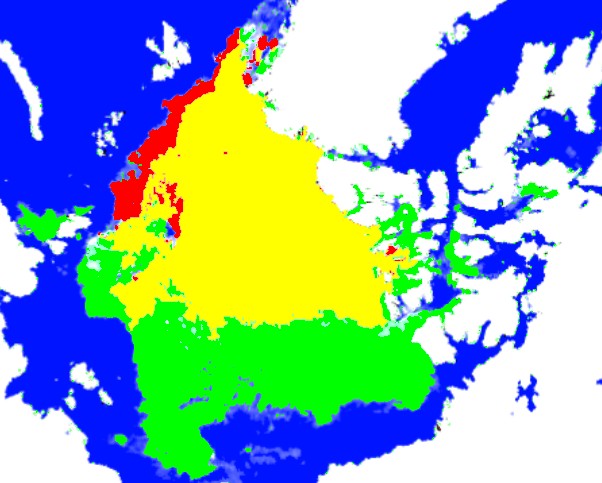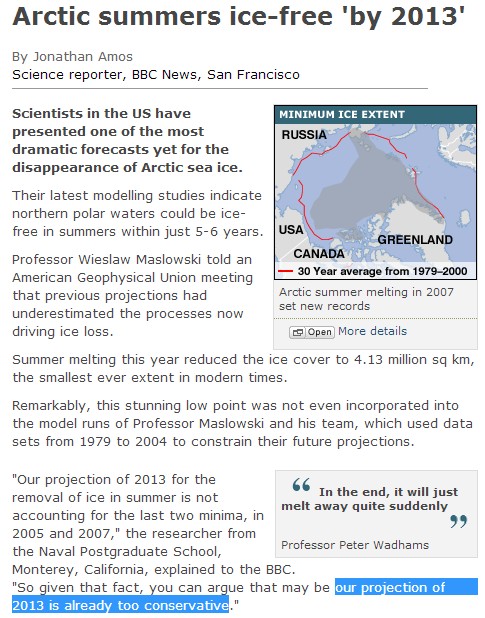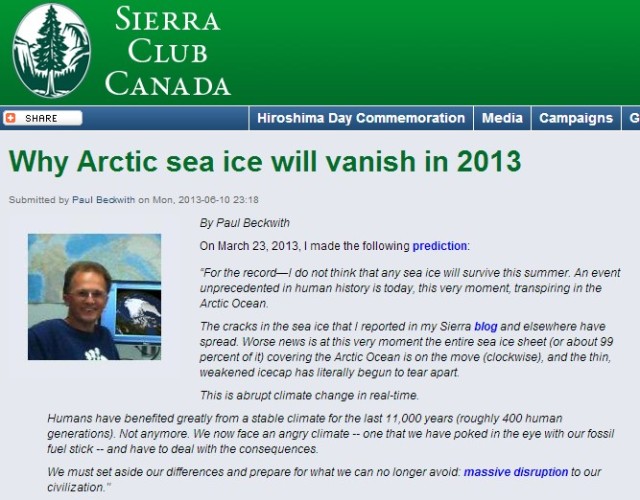Sea ice decline in the Arctic reveals new findings
The Alaska landscape is changing in unexplainable ways according to the University of Alaska Fairbanks, which posted a recent review of the changing ecosystems in the Arctic as a result of declining sea ice. The review shed new light on the loss of northern sea ice and its affect on the surrounding areas in the Arctic.
"Our thought was to see if sea ice decline contributed to greening of the tundra along the coastal areas," said Uma Bhatt, an associate professor with UAF's Geophysical Institute. "It's a relatively new idea."
The team of researchers analyzed over 10 years' worth of comprehensive data on the decline of sea ice, examining the time frame between 1982 and 2011 and looking at the time series of remote sensing data to look more closely at the decline of sea ice, the land-surface temperatures of the affected areas, and the changes in the vegetation abundance.
The data was collected by determining the land-surface summer warmth index (SWI) and calculating the regression of the sea ice using the least squares fit at each pixel. The index is the annual sum of the monthly mean temperatures above 0 degrees Celsius.
The calculations of the declines of sea ice come from readings from instruments on various NASA and NOAA satellites that have continuously been monitoring the changes in vegetation from space. Scientists and researchers have been using this collected data to calculate the Normalized Difference Vegetation Index (NDVI), which is an indicator of photosynthetic activity or "greenness" of the Arctic landscape.
Bhatt and her colleagues heavily relied on the satellite data, but it wasn't enough to answer all the questions as to why the greening is occurring.
"We have satellite records going back to 1982, but we don't have a lot of ground data." Bhatt said.
One of the findings that explain the newly noticed greening of the arctic areas is that the warming soils provide and opportunity for new vegetation to grow and flourish in areas where less vegetation had been able to thrive in the past. The review also found that despite a general warming and greening of Arctic lands that have been the result of sea ice decline, some areas in North America and northern Russia along the Bering Sea coast of Alaska are showing cooling trends and declines in vegetation productivity.
"The story of Alaska in this study is interesting as we are seeing two things going on." Bhatt said. "One, the Arctic areas around the North Slope are greening and secondly, the areas affected in Southwestern Alaska are browning. Our speculation towards this is a combination of a reduction of snow, which has contributed to less moisture in these areas, and secondly that the summer air may be cooling down as the ocean air that is coming in is getting cooler."
Many Boreal forests in North America have been greening, but this trend was not as strong in the tundra of the circumpolar arctic, as these boreal forests experienced "browning" as a result of less photosynthetic activity over the study period.
"Boreal forest is not the tundra, as the tundra is mostly high grass and shrub." Bhatt said. "It's actually these very little woody plants, shrubs and the beginnings of smaller trees that are moving in and are contributing to the greening of the Arctic."
The reason for this is still unknown, but droughts, forest fire activity, animal and insect behavior, industrial pollution and a number of other factors may have contributed to the browning trend in these areas.
Perhaps the main focus of the review was to take a closer look at the decline of sea ice and its role in the changing marine and terrestrial food chains. The decline and disappearance of sea ice means a loss of sea-ice algae, which is the foundation of the marine food web. Larger plankton is seen to be increasing, which is replacing smaller, more nutrient dense plankton. Above the water, the old pathways of several animal migrations has been disrupted by the decline of sea ice and several other pathways have been opened. Some terrestrial plants and animals will become more isolated because of this. In the case of the northernmost and coldest parts of the arctic, entire biomes may completely disappear.
"Some animals and plants will become more isolated. In the case of the farthest north and coldest parts of the Arctic, entire biomes may be lost without the cooling effects of disappearing summer sea ice," the press release stated.
"After a decade with nine of the lowest Arctic sea-ice minima on record, including the historically low minimum in 2012, we synthesize recent developments in the study of ecological responses to sea-ice decline," the review from Science Magazine said. "Sea-ice loss emerges as an important driver of marine and terrestrial ecological dynamics, influencing productivity, species interactions, population mixing, gene flow, and pathogen and disease transmission. Major challenges in the near future include assigning clearer attribution to sea ice as a primary driver of such dynamics, especially in terrestrial systems, and addressing pressures arising from human use of arctic coastal and near-shore areas as sea ice diminishes"
While more research and more reviews are expected in the future to answer some of the many unanswered questions regarding the loss of sea ice and what it means for life in the Arctic, researchers at the University of Alaska Fairbanks are hopeful.
"This all illustrates the complexity of the Arctic system and why scientists from different disciplines should work together to understand it," Bhatt said in the press release. "The review article is one of the first steps in this direction."
- - - snip - - -
Green shows ice present in 2013 which was not present on this date in 2012. Red shows the opposite. There has been a 73% increase in ice since this date last year.
Our top government experts say that all of the ice is doing to melt in the next few seconds.
the Arctic will be ice-free in the summer of 2013- John Kerry, US Secretary of StateJames Hansen : ‘This is the last chance’6/23/2008“We see a tipping point occurring right before our eyes,” Hansen told the AP before the luncheon. “The Arctic is the first tipping point and it’s occurring exactly the way we said it would.”Hansen, echoing work by other scientists, said that in five to 10 years, the Arctic will be free of sea ice in the summer.June 26, 2013The alarming loss of sea ice which has grown worse each summer over the past several decades, has taken a sharp turn for the worse: this year the loss is right in the middle, the most resilient part of the ice cover. This could lead to a completely ice-free Arctic Ocean by September.



9 comments:
Come on Doug. Steven Goddard is a quack. You have good informational posts on the NW Passage. Why do you include this crap?
Does the Arctic have more ice than last year at this time? The satellite images and ice charts say yes. Steven Goddard's articles provokes thought - with a numb world population I'm hoping to wake a few couch potatoes up to what is going around them.
KUDOS Steven for your contributions. Lets see University "science" provide details which opens peoples minds - I'm turned off from the profs I talk with because they think they have it all figured out - bs - open your mind - get out of the classroom and lecture halls more.
I remember the yelling of Goddard about the 'recovery' of Arctic ice in 2008, after the record low in 2007. Deja vu.
I agree with the other anonymous: please stay away from this BS.
Looking forward to two Anonymous posters making new posts here without hiding their identity...
The Current State Of Official Global Warming Knowledge
Posted on August 31, 2013 by stevengoddard
Temperatures are falling, while rising faster than ever
Arctic ice has grown tremendously, and is retreating at a record rate
Sea level rise rates haven’t changed, and threaten to drown the Earth
All of the climate models massively over-predict temperature rise, and are conservative
Scientists can’t figure out why the Earth isn’t warming, but the debate is over – global warming is going to kill us all.
This is a great discussion. Anonymous discussing sea level rise with a man who has spent his life at sea. Capt of the Grey Goose, how likely is it for sea level rise to 'drown' the Earth? I grew up on the coast of the Pacific Ocean. That was my playground. I am 63 years old, and I remember the ebb and flow of the tides.
To my mind, I see the ebb and flow of the Arctic sea ice extent over the last several dozen years as maintaining an average. Just the same as global temperatures have maintained a similar average range over the last 16 years. This years record low temps for summer is not what the IPCC, PIK, or UKMO were predicting. We need to observe what nature is doing, before making broad based policy decisions that can have severe negative impacts of their own on everyone. If you want to talk about environmental problems, then the talk should be about land use changes from having 7+ billion humans on this planet.
If you want to tempt fate, organize an expedition to one of the polar regions to call attention to the perils of global warming. The outcome is foreordained: Mother Nature will continue her cyclical nature with cold, winds, ice, snow etc...
From where I make my observations I continue to see so called 'scientist' recanting the same dogma, just like the Media industry pushing the same news article to fill space... details are lost without references or never provided with broad brush strokes. I really get a kick when it is in a 'peer reviewed' publication and they think it is then lily white pure science... use your mind and eyes to observe and remember cognitive dissonance is everywhere - people speak with two tongue and they reason which ever way makes their case... if you are lucky enough to be on the strait and narrow then accept it and move on because no amount of logic or reasoning is going to change them... reality is illusive and just as the tides flow in and out so does their thinking. This is my last comment on the posting - there are fish to be caught and enjoyed on the BBQ and I'm the fisherman and cook today.
Ignore trolls Captain. Great Blog. Thanks.
Thanks to my father who shared with me regarding this web site, this
website is actually awesome.
Here is my web-site ... to make you feel my love
Post a Comment
Enter your comment(s) here...